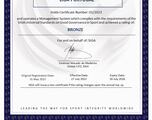What makes a good owner? Principles for corporate governance in professional soccer
As the Premier League wrestles with the proposed introduction of an independent regulator, as part of SIGA Sport Integrity Week we discuss the dangers hidden in the world of club ownership

Club ownership is becoming an increasingly contentious issue in English soccer, one that has proved divisive amongst organisers, teams and supporters. Short-term goals and long-term necessities have to be balanced to ensure that that clubs are ran in a sustainable manner.
To better understand the complex system of club ownership in the United Kingdom, and as part of SIGA Sport Integrity Week, we spoke to three experts with unique insight into the situation.
Ross Legg, of PA Consulting, has vast experience of corporate governance and the role of regulators.
As Head of Supporter Engagement and Governance at the Football Supporters’ Association, Ashley Brown is at the forefront of the push for greater sustainability in English football.
And John Hird, founder of supporters group ‘NUFC Fans Against Sportswashing’, knows only too well the importance of transparency and integrity in club ownership.
In our wide-ranging discussion, we covered the following topics…
Current state of play in English soccer
As it stands, many in the game feel that the regulatory framework surrounding club ownership does not go far enough. There are countless examples of mismanagement and in some cases it is difficult to know exactly who the owner is.
The Football Association (FA) has devolved regulatory responsibility to the Premier League and the Football League. However recent acquisitions, such as the Saudi-led takeover of Newcastle United, has posed new questions for those in charge and sparked a fresh debate about the role of regulators.
This is increasingly important in the murky world of club ownership.
As Ashley Brown explained, “The people who own football clubs are sometimes individuals, sometimes nation states. We’ve now got pension funds, hedge funds, as well as other corporate conglomerates.”
“We have a range of types of owners and quite often we have football clubs where we don’t actually know who the owner really is.”
Clubs need protection
One of the key points of the discussion centred on the nature of soccer clubs. No longer simply sports teams, Premier League clubs are cultural institutions; multi-national businesses; large-scale employers; and, increasingly, a pawn in geopolitical conflicts.
“In the government White Paper, it says that football is different to other businesses. It’s recognised,” Newcastle fan John explains.
“In my region, Newcastle United is part of the culture, it’s almost a religion, and now for many football fans it’s starting to be connected to the Saudi regime.”
“There is a genuine fear amongst fans, of the direction that football is going.”
Forward-thinking is a must
Of all the various ownership models and potential regulatory bodies, there is one key point that all members of the panel agreed upon. To ensure the long-term health of its clubs English soccer must be more proactive in its response.
Far from a short-term fix, the remedy for many of the game’s current issues are found in long-term thinking. Ross Legg believes that, in many cases, soccer is unwilling to think beyond the most pressing issue.
He explains: “The thing here is not thinking, ‘Where do we want to be in the Premier League by 2025?’ but actually, ‘What do we want the landscape of English football to look like by 2050?’”
Can English soccer find a considered, long-term response to the current trends of club ownership? As our panel asks, can it afford not to?
Sport Integrity Week
AS is proudly hosting SIGA Sport Integrity Week this morning, Wednesday 6 September. Over the week SIGA, the world’s leading organisation for sport integrity, is advancing the integrity agenda with a thought-leadership event taking place across the entire planet.
Fair opportunity in sports for all athletes
Can blind people play golf? A visually-impaired golfer explains the impact of the sport on his life

